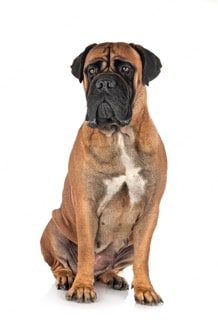
The Bullmastiff is an incredibly loyal dog breed of Mastiff descent. They originate from the 19th century in the United Kingdom; a breeds combination of a Bulldog and a Mastiff were what created this unique and majestic breed. Bullmastiffs are powerful, muscular and large dogs with a short muzzle and a broad head. They have wide necks and small ears which are set high on their heads and fold over. The Bullmastiff’s coat is dense and short, usually tan, red or brindle and their Under coat is generally light in color. The tail is low set and is feathered like a coat. Bullmastiffs tend to benefit from feathering around the chest, feet and tail which helps add to the distinguished Bullmastiff look. This dog breed is unique when compared to other breeds due to their immense loyalty and trustworthiness. This makes them an ideal guard dog and protector of the family and home. It is their protective and attentive nature that sets the Bullmastiff apart from other dog breeds.
The Bullmastiff is an incredibly gentle and affectionate giant breed. They are very intelligent and love to please their owners, making them very easy to train. Bullmastiffs are incredibly patient and tolerant, which makes them wonderful companions for children and other pets. They crave regular exercise and activity, and thrive on daily walks, runs, and playtime. While they love and need lots of space to roam around in, Bullmastiffs can also do well with living indoors as long as they get the necessary exercise. The breed is known for being quite calm and quiet, and makes an excellent watchdog with its protective and loyal behavior. Early training and socialization will help these giants develop into well-mannered and gentle individuals, and they form strong bonds with their owners in no time.
The Bullmastiff is a bold and fearless guard dog who needs a nutritious diet that consists of at least 20% protein and 10-15% fat. Feed them 1-2 meals per day, and provide plenty of fresh water at all times. Healthy treats can be given in moderation. Weight management is important as Bullmastiffs are prone to hip dysplasia and joint issues, so avoid overfeeding and maintain a healthy weight. Exercise regularly to ensure a healthy lifestyle for this breed.
They are prone to hip dysplasia, inherited heart defects, and eye diseases. Regular veterinary check-ups, vaccinations, and preventive care are essential to maintain their health and longevity. It is also important to maintain a proper nutrition for your Bullmastiff; providing a balanced diet made of quality protein and food containing essential fatty acids. They should have limited access to certain foods and snacks to avoid obesity. Regular exercise and walks can also help to keep your dog active and maintain a healthy weight. Grooming your Bullmastiff regularly is essential to help keep its coat, skin, and nails healthy. Brushing with the right tool, bathing, and ear-cleaning should all be part of your Bullmastiff’s weekly grooming routine. With proper care and regular check-ups, you can ensure your Bullmastiff will live a happy and healthy life.
Bullmastiffs are large dogs with a life expectancy of 8 to 10 years. Responsible ownership and adoption is crucial for the wellbeing of the Bullmastiff. Knowing what food is okay for your dog and which to avoid is key for a healthy diet. Check out Way Canina and learn more about your Bullmastiff and find the best nutritional requirements and feeding options for them. Responsible ownership and adoption, healthy diet and nutrition, moderate treats and regular exercise are all important factors for a healthy Bullmastiff.
Are you thinking about getting a Bullmastiff? Owning a dog is a big commitment, so it’s important to do your research before selecting the right breed for you. Bullmastiffs are loyal, intelligent, and great guardians but they also have specific needs when it comes to exercise, diet, and other health considerations. Here at Way Canina, we have blog posts and articles with valuable information comparing different breeds, so you can learn more about the lifestyle and wellbeing of different dogs. If you’re considering getting a Bullmastiff, please check us out to make an informed decision.”